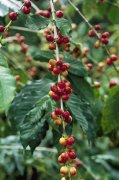Coffee bean ingredients the ingredients of coffee can be divided into the following

Caffeine: it has a particularly strong bitter taste and stimulates the central nervous system, heart and respiratory system. The right amount of caffeine can reduce muscle fatigue and promote digestive juice secretion. It also promotes kidney function, has a diuretic effect, and helps the body expel excess sodium ions from the body, but eating too much can lead to caffeine poisoning.
Tannic acid: the boiled tannic acid will decompose into pyrouric acid, so the coffee that has been brewed for too long will taste worse.
Fat: the most important ones are acid fat and volatile fat.
Acidic fat: fat contains acid, its strength will vary according to the type of coffee.
Volatile fat: is the main source of coffee aroma, it is a kind of aroma will emit about 40 kinds of aromatic substances.
Protein: the main source of calories, the proportion is not high. Most of the protein in coffee beans will not dissolve out when brewing coffee, so the intake is limited.
Sugar: coffee beans contain about 8% sugar. After baking, most of the sugars are converted to caramel, which browns the coffee and combines with tannins to produce sweetness.
Fiber: the fiber of raw beans will be carbonized after baking and combine with caramel to form the hue of coffee.
Minerals: contains a small amount of lime, iron, phosphorus, sodium carbonate and so on.
Coffee nutrients: per 100 grams of coffee beans contain 2.2 grams of moisture, 12.6 grams of protein, 16 grams of fat, 46.7 grams of sugar, 9 grams of cellulose, 4.2 grams of ash, 120 milligrams of calcium, 170 milligrams of phosphorus, 42 milligrams of iron, 3 milligrams of sodium, 0.12 grams of vitamin B2, 3.5 milligrams of nicotinic acid, 1.3 grams of caffeine and 8 grams of tannins. Every 100 grams of coffee extract contains 99.5 grams of water, 0.2 grams of protein, 0.1 grams of fat, 0.1 grams of ash, trace sugars, 3 mg of calcium, 4 mg of phosphorus, 2 mg of sodium, 0.01 mg of vitamin B2 and 0.3 mg of nicotinic acid. Dissolve 10 grams of coffee in hot water with 0.04 grams of caffeine and 0.06 grams of tannins.
Important Notice :
前街咖啡 FrontStreet Coffee has moved to new addredd:
FrontStreet Coffee Address: 315,Donghua East Road,GuangZhou
Tel:020 38364473
- Prev

The benefits and disadvantages of drinking coffee The benefits of drinking coffee on the body
The benefits of drinking coffee can be listed as follows: (1) Coffee contains certain nutrients. Nicotinic acid in coffee contains vitamin B, which is higher in roasted beans. And there are free fatty acids, caffeine, tannic acid and so on. (2)Coffee is good for the skin. Coffee can promote metabolic function, activate digestive organs, constipation has a great effect. Using coffee powder in the shower is one way
- Next

The Origin and characteristics of all kinds of fancy Coffee (1)
The word coffee comes from the Greek word Kaweh, which means strength and enthusiasm. Coffee tree is an evergreen shrub of Capsaceae. Daily coffee is made from coffee beans combined with a variety of cooking utensils, and coffee beans refer to the nuts in the fruit of the coffee tree, which are then roasted with appropriate roasting methods. There are many different flavors of coffee in the world, which make up me today.
Related
- Beginners will see the "Coffee pull flower" guide!
- What is the difference between ice blog purified milk and ordinary milk coffee?
- Why is the Philippines the largest producer of crops in Liberia?
- For coffee extraction, should the fine powder be retained?
- How does extracted espresso fill pressed powder? How much strength does it take to press the powder?
- How to make jasmine cold extract coffee? Is the jasmine + latte good?
- Will this little toy really make the coffee taste better? How does Lily Drip affect coffee extraction?
- Will the action of slapping the filter cup also affect coffee extraction?
- What's the difference between powder-to-water ratio and powder-to-liquid ratio?
- What is the Ethiopian local species? What does it have to do with Heirloom native species?

